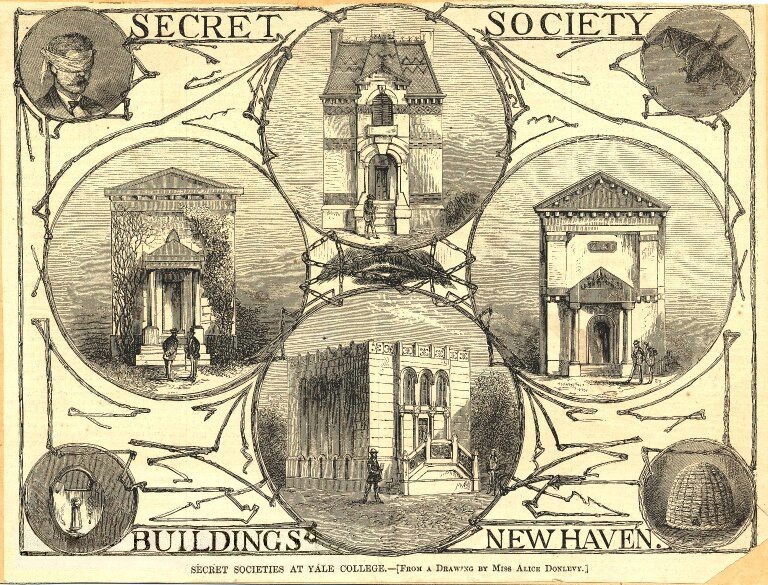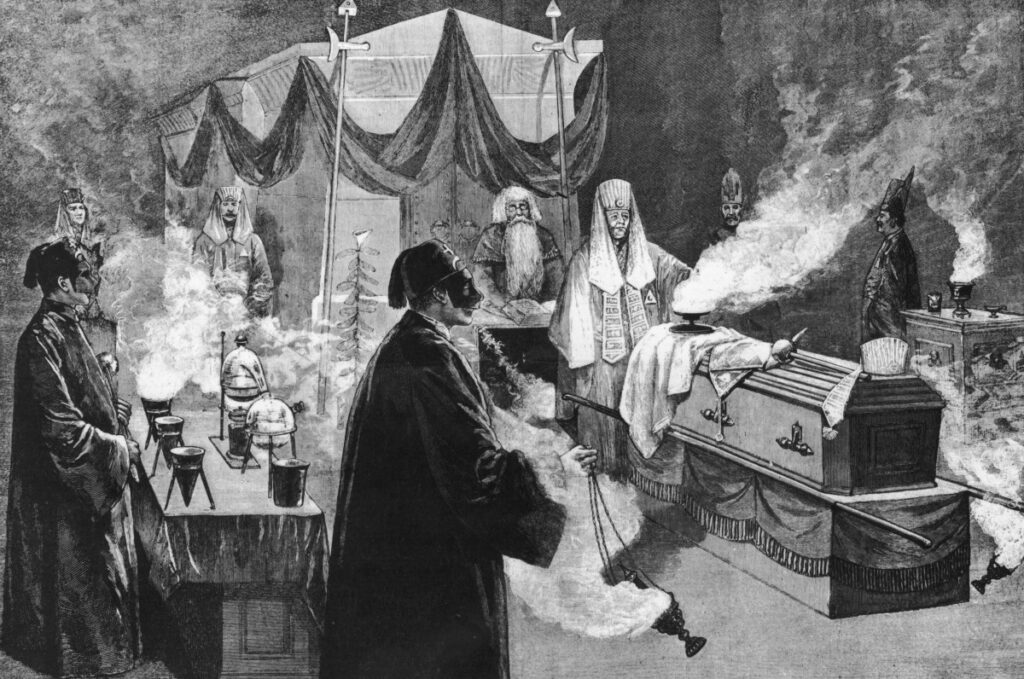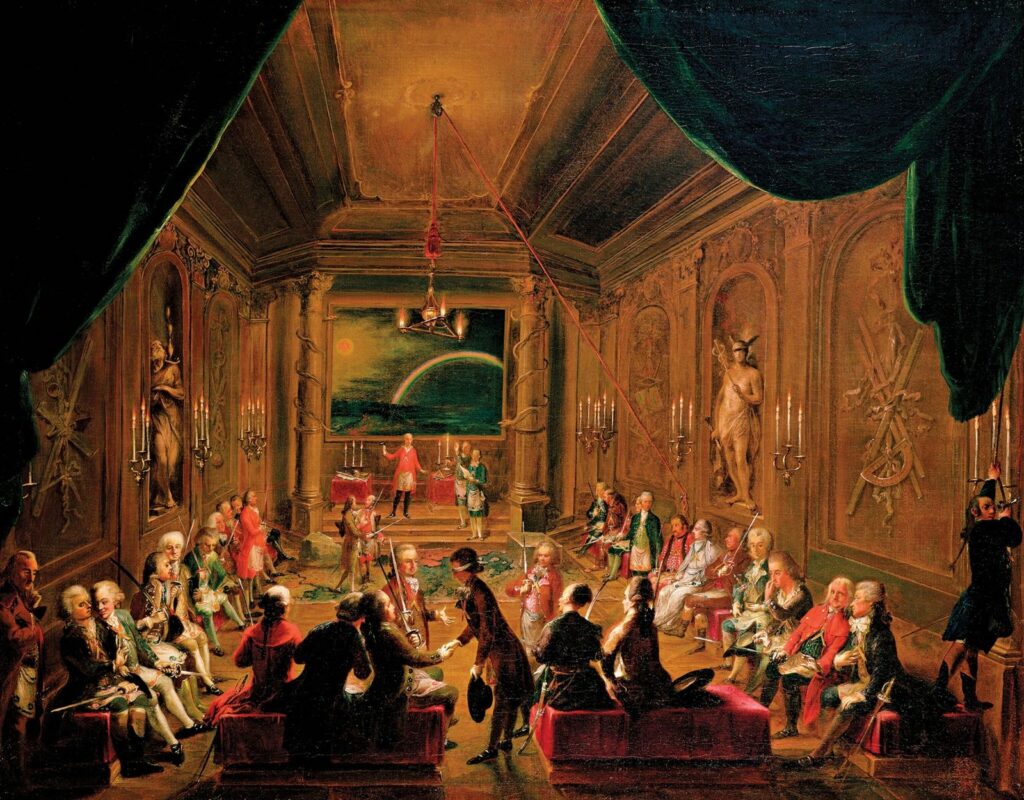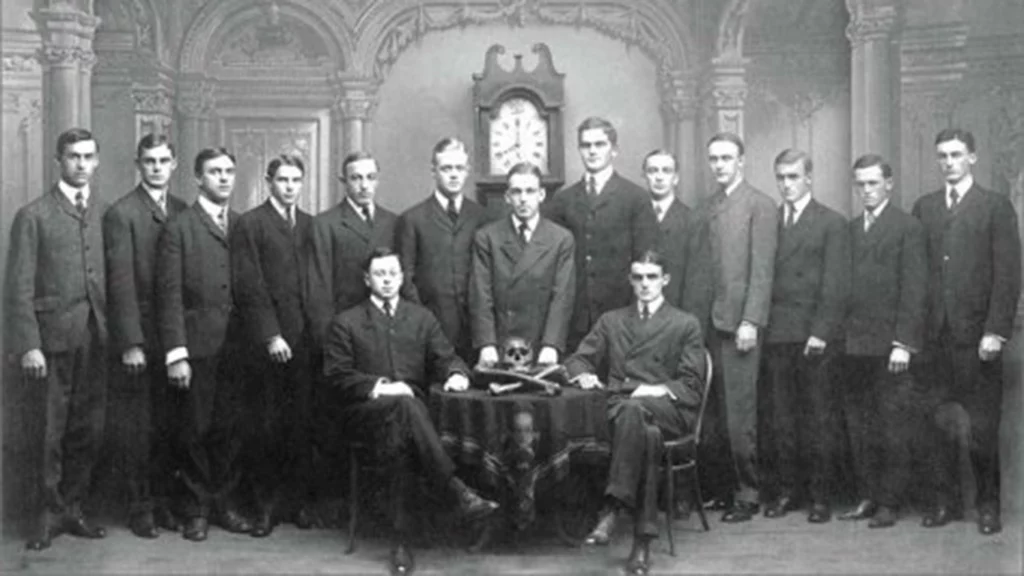Secret societies, often known as fraternal orders, are organisations based on common interests or ideals. Their rituals and inner workings are often shrouded in secrecy, along with the knowledge of their members. However, millions of people joined the ranks of thousands of secret societies, especially in the late 19th century and early 20th century. For example, in 1896, fraternal orders had more than 4.7 million members so there’s a good chance that your ancestors were part of one of a secret society and there are ways you can find out!

What were the common secret societies?
There have been lots of secret societies and organisations through time, but some of the most common ones are the Freemasons, Odd Fellows, Knights of Pythias, Knights of Columbus, Woodmen of the World, and Patrons of Husbandry.
Guilds began to form during the Middle Ages and were confederations of people practising the same trade of profession.
However, not all societies were based on profession, nor were they shrouded in secret, and they tend to fall into seven categories.
Social:
These groups trace back to late 18th century drinking clubs, which allowed likeminded individuals, usually men, to get together and drink, converse, and play games. Some of the best-known fraternal organisations such as Freemasons or Odd Fellows could be considered social societies.
Benevolent and Service:
The broad goal of these societies is to help others. Benevolent organisations generally help their own members while service societies primarily assist charities.
Despite the distinction, these societies often overlap. For example, the Independent Order of Odd Fellows, a benevolent society, also assists local and national charities. The Lions and the Rotary Club are primarily service organisations but help their own members too.
Ethnic:
People of the same ethnic heritage formed their own fraternal organisations, and they served three main purposes. They allowed members to maintain a link to the old country as people exchanged news from back home. They also preserved old world traditions and culture so their children and future generations could know their heritage. Thirdly, the groups also provided insurance for its members.
Trade:
These were occupation-based organisations which grew from workers need to band together. Their objective was often insurance; workers in certain trades couldn’t get coverage as their job was too dangerous. Some trade societies resembled, or often became, labour unions. They also acted as support networks and encouraged service to others, for example, the Patrons of Husbandry.

Religious and Mystical:
Knowing your relative’s religion may narrow down your research into fraternal groups. For example, if you have Catholic ancestors you may want to investigate the Knights of Columbus. This organisation was founded in 1882 so Catholic men could join a fraternal organisation without defying papal decrees.
Political:
These groups aren’t as prevalent as they once were. They cropped up in response to countries limiting the freedom of their people. The societies aimed for change and wanted to achieve this by rebelling against their government.
Criminal:
Groups such as La Cosa Nostra (the Sicilian group known as the Mafia), and the Chinese Tongs also qualify as fraternal organisations. Criminal groups are true secret societies, in a less benign sense since they conceal illegal behaviour instead of secret rituals or trade secrets.
Why were people in secret societies?
There are many reasons why our ancestors may have joined a secret society, but a common reason was that these organisations provided a significant form of fellowship for our ancestors. The societies gave them opportunity to interact with people who shared their religion, occupation, social status, ethnicity, or philosophical beliefs.
These societies often offered members a form of life insurance as clubs collected dues at regular meetings to pay for funeral costs. They also had an obligation to take care of the widows and orphans of its members. Some orders paid illness, disability, and funeral benefits to members as well. Benevolent societies in particular offered assistance when members were injured, ill, died, or lost their jobs. Guild societies bound their members to protect trade secrets which was for economic self-protection.

How do you find your ancestors in a secret society?
If you suspect your ancestor belonged to a secret society, there are certain clues which can confirm your hunch. Though many organisations required members to take oaths of secrecy, those vows primarily applied to the groups ceremonies and members could, and did, openly acknowledge association.
Start by writing down everything you know about your ancestor including their religion, occupation, education, and ethnic heritage. Every small detail could give you clues as to an organisation they were in. Once you have done this, you can then research organisations which were active in the area they lived. To do this you can use city and country directories, as they often provide information about societies in the area. Check libraries for histories of specific orders as you may find information about a groups growth and whether they moved.
From this you can create a list of societies that you think ancestor could have belonged to. Be careful not to rule out societies too quickly based on their name, as they can be misleading!
Once you’ve determined likely candidates, you can start looking for proof! Finding records for any fraternal group requires tenacity as, unlike censuses and other genealogical records, they aren’t readily available but there are places you can look.
Start looking close to home. Our ancestors would wear jewellery with their group’s signs, had their pictures taken in full fraternal regalia, had their order’s insignia on stationary, and even on their gravestones! So, look over your heirlooms and papers for anything pointing to membership to a society. Learning fraternal insignias will help place your ancestors in a particular society so look online for the signs, icons, acronyms, and more of different orders.
There are plenty of other places you can look for records of members association with societies. Of course, tracking them down gets more challenging when you’re researching a society which no longer exists, but even secret societies leave paper trails!
Check familiar genealogy websites as they sometimes contain records linking to fraternal societies. Pay particular attention to local and county genealogical society records, and state and local archives as some have fraternal collections. Also, look at online manuscript databases, directories, and society websites in your area of interest for more information and records. Some specific places you can search online are:
- The Worldwide Masonic Directory, 1860 on Ancestry listing Freemasons.
- The Massachusetts Membership Cards, 1733-1990 on Ancestry relating to the Freemasons.
- The Sons of the American Revolution Membership Applications, 1889-1970 on Ancestry.
- ArchiveGrid manuscript database.
- Family Search.
- HathiTrust.
- WorldCat
If they aren’t online, records may be stored in multiple places. Some of these include:
- Places organisations met such as lodges, clubs, or headquarters.
- Local and state historical societies.
- Archives.
- Libraries (state, local, and university).
You can also find a variety of information and records from these resources, such as:
- Account books – Clubs were meticulous about money and recorded dues paid from members.
- Withdrawal cards – These signified all a member’s dues were paid and they had permission to join another society.
- Meeting minutes – These will often list the members present, and information about club objectives and events.
- Written histories – Clubs often produced these which include biographies and photos of their founding members.
- Meeting notices in newspapers.
If you can, reach out to the society’s nearest branch, or last known branch, as someone might be able to help you find records and whether you can get copies. Remember fraternal organisations are private organisations so unlike government agencies, they aren’t required to open their records to the public.

Understanding the background of your ancestor’s fraternal order can help you determine where and how to look for records. Alan Axelrod’s The International Encyclopedia of Secret Societies & Fraternal Orders provides background, addresses, membership figures, and more about numerous orders. It will be an invaluable tool for any secret society research.
I hope you have found this blog interesting and maybe it has sparked an interest to see if one of your ancestors was part of a secret society! Hopefully with these tips and tricks you will uncover more information and gain a deeper understanding into your ancestors’ lives!

